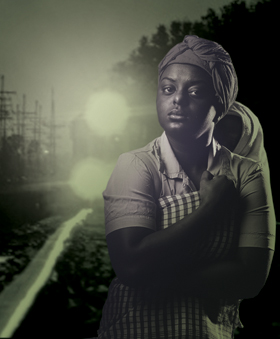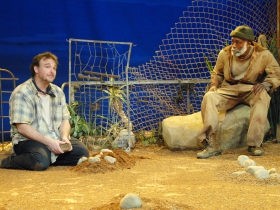

An element of fear haunts the South African graveyard in which Athol Fugard’s play, The Train Driver, takes place. Two men – one black, one white – are the unlikely pair playing out this compelling drama.
Like many of Fugard’s plays, this one tackles the subject of race relations. One can easily go beyond the play’s South African setting to make parallels between the events in the play and recent racial protesting and rioting in American cities such as Ferguson, MO. Both locales suggest a great deal of suspicion between blacks and whites. Perhaps it is fitting that the play makes its Midwestern premiere in Milwaukee, widely considered as one of the most racially segregated cities in America.
In The Train Driver, a white man with that job description has traveled far on foot to reach the graveyard, which probably contains the woman’s grave he is desperately seeking. The unknown woman – and a baby she carried on her back – stepped onto the tracks just as the train was approaching. Roelf Visagie (David Daniel), the train’s driver, was unable to stop the train before she disappeared beneath the train’s wheels.
Upon his arrival at the forlorn, untidy graveyard, Roelf meets Simon (Michael A. Torrey), an elderly caretaker who tends the graves. Simon lives among the dead in a weather-beaten tin shack. He is agitated to see a white man in this area of town. As Roelf instructs Simon to take him to this woman’s grave, a wide-eyed Simon says he can’t remember the exact location. This only infuriates Roelf even more. He confides that he wants to curse this woman for turning his whole world upside down. “I’m losing my family, my job and my mind,” he rants. Despite some professional counseling he received right after the event, he is still clearly haunted by this experience. He tells Simon he will never forget the look in the woman’s eyes. He said her expression seemed passive, as if she was merely waiting for the train to end her life. He can’t fathom why a young mother would do something like this.
When Roelf finally questioned the coroner about the dead woman’s whereabouts, he learned that no one had come forward to claim the body. As a result, she was transported to a lonely graveyard far away, where nameless African-Americans are buried.
Finally halting his rant for a moment, Roelf pauses to take a look around. “This place isn’t fit for humanity,” he tells Simon. “I wouldn’t bury my dog this way.” He is especially peeved at the graves’ “decorations.” Since no one will come to place flowers on these forgotten graves, Simon, explains, he has adorned the piles of dirt with rocks, bits of pottery and rusty hubcaps. “Why don’t you get some wood and make crosses for them?” Roelf inquires. Simon says that the wood would only be stolen for use as firewood. The rocks, he explains, are handy weapons in case wild dogs attempt to dig up one of the graves. He says proudly that he has gotten very good at scaring off the dogs. For nearly 50 years, playwright Athol Fugard has traveled similar landscape in search of answers to his country’s fractured racial connections. The Train Driver, his newest play, premiered in 2010 in Cape Town, South Africa. It was produced Off-Broadway in 2012. Milwaukee Chamber Theatre’s production is its first in the Midwest, most likely due to the connection between Athol Fugard and the Chamber’s producing artistic director, C. Michael Wright. His association with Fugard goes back to Fugard’s first hit, Master Harold … and the Boys. Wright played Harold in the Broadway production and in subsequent international tours. All of these productions were directed by Fugard himself. This production, directed by Wright, is compelling and intense during its entire 90 minutes. The play is based on an actual event that received scant mention in a South African newspaper. Back in the graveyard, as the first day ends, Simon finds he cannot convince Roelf to find refuge in safer quarters. He warns of young, black ruffians who prowl the area, “carrying long knives.” He knows that Roelf would be easy prey for this type of gang, and perhaps Simon would be punished by them as well. “I am too old to run away,” he says, almost dragging Roelf into his tiny shack. Roelf is too distracted to sleep or eat. He tells Simon of his own home, and his family. He characterizes his wife as a woman with “hygiene as her hobby.” He says he can’t imagine her reaction to seeing Simon show up at their door. They have two children, which makes the black woman’s suicide all the more puzzling to Roelf.
The two men do find common ground, such as their love for fresh fish. Roelf seems genuinely impressed to hear Simon talk of catching fish in his hands as a small boy. Still, Roelf can’t drive away the images of what he has seen while pursuing the woman. He tells Simon of the dirty hovels in which the residents live. “One man even offered to sell me a girl, if that’s what I wanted,” Roelf said in genuine disgust. Roelf’s anger eventually turns to understanding. He tells Simon he doesn’t want to curse at the dead woman anymore. Simon seems puzzled by this. But he lets Roelf go on with his story. “When I saw what I did in (the villages) on the way here, I saw what it’s like to live without hope,” he said. “I guess I might do the same thing if that’s how I felt.”
Under Wright’s excellent direction, both of the actors deliver memorable portraits of their respective characters. It is clear both actors have mastered the words and phrases of Xhosa and Afrikaans languages called for in the play. Although Simon has far fewer lines than his white counterpart, Michael A. Torrey does an amazing job of communicating his feelings through gestures and expressions. His complete mastery of the South African accent and words is amazing to watch. This is definitely a don’t-miss evening, with production qualities equally amazing. The realistic set seems to have been transported directly from South Africa, effectively lit by Stephen Roy White. Even the music between scenes heightens the drama, with various voices and instruments heard through the whistling winds.
A master storyteller such as Fugard manages to end the play on a questioning note. However, there’s no questioning his message that peace and harmony must prevail to make the world worth living in.
